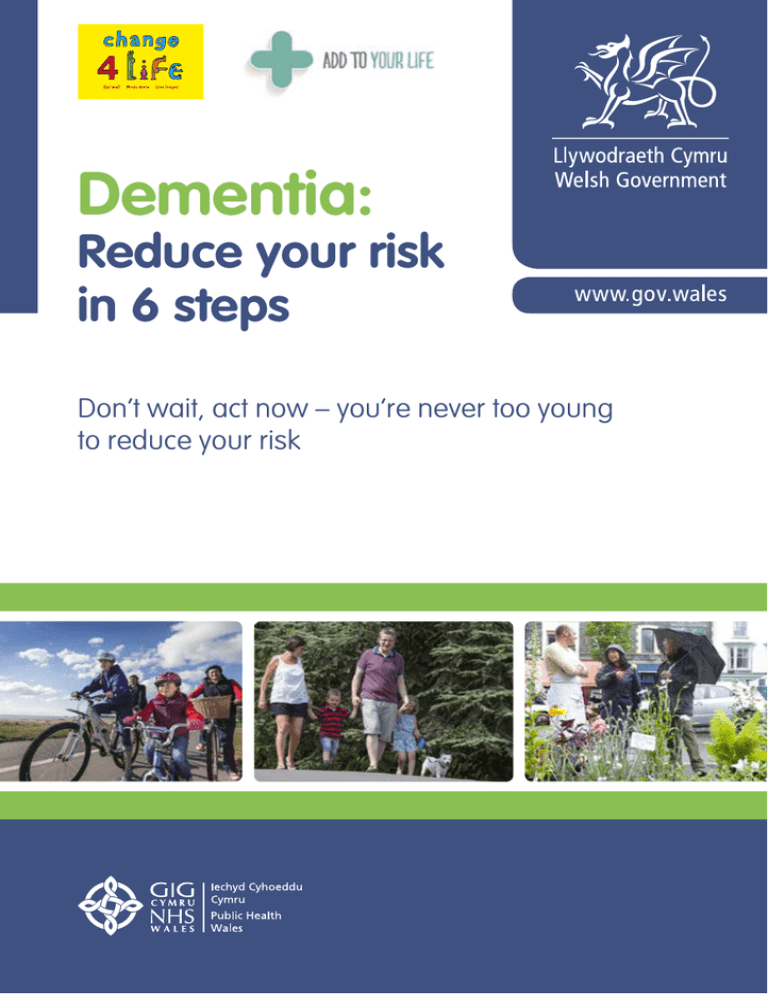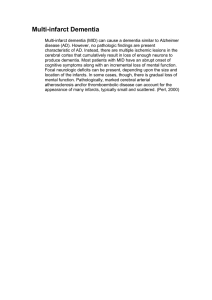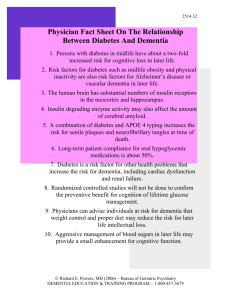Dementia: Reduce your risk in 6 steps
advertisement

Dementia: Reduce your risk in 6 steps Don’t wait, act now – you’re never too young to reduce your risk What is dementia? Dementia is a term used to describe a progressive loss of the powers of the brain. The most common kinds of dementia are Alzheimer’s disease and vascular dementia (caused by reduced blood flow to the brain). These conditions damage brain cells causing memory, communication and thinking problems. This can affect people’s ability to manage money, prepare food, get dressed and other essential living skills. It’s never too early or too late to take steps to reduce your risk of dementia In this leaflet you can find out about: • lifestyle choices that affect your risk of dementia • steps you can take to reduce that risk • where you can find more information and support Reducing the risk – the facts The risk of dementia increases with age, and as more people are living longer, the number of people developing dementia will grow. However, it’s never too early or late to start following the 6 steps to reduce your risk of dementia. By taking these steps, you can significantly improve both your physical and mental health as you age. Here in Wales, a study in Caerphilly looked at the health behaviours of over 2000 men aged 45–59. The study looked at the person’s weight, how active they were, how much they smoked, how much alcohol they drank and if they were eating a healthy diet. It found that people could reduce their risk of developing dementia by up to 60% by simply living a healthier lifestyle. 6 Steps to reduce your dementia risk The following six steps will not only make you feel better and reduce your risk of developing dementia, but will also help protect you from other health risks such as cancer, heart disease, stroke and diabetes. Step 1: Be physically active Step 2: Maintain a healthy weight Step 3: Be socially and mentally active Step 4: Avoid drinking too much alcohol Step 5: Stop smoking Step 6: Commit to review your health Small changes to your lifestyle can over time, lead to BIG changes in your health. The Caerphilly Study showed that adopting any one of these six steps would be beneficial in reducing your risk and that the more steps that you follow, the greater the impact. Over the next few pages we will provide help, guidance and support to make these changes. Step 1: Be physically active The number one thing you can do to reduce your risk of getting dementia is to be physically active. You don’t have to be an Olympian to do this. Walk often, go for a run and if you can, take a class at the local leisure centre. There are lots of other ways to be active: riding your bike or pushing a lawn mower also count. Change4lifewales contains lots of ideas to help get you moving! It is recommended that you should do 150 minutes of exercise each week. This might sound like a lot but can be achieved in blocks as short as ten minutes at a time. Walking fast counts towards this, so you may already be doing more than you think. Little changes, such as going for a walk or a ride on your bike at lunchtime, may be all you need to do. There are lots of other ways to build physical activity into your daily life, for example replacing short journeys in the car with walking, or using the stairs instead of lifts. Time your walks to the shop or to work and also check out how many steps you are already doing. You can use a pedometer to do this; most smart phones have them already built-in. Challenge your friends, family and work colleagues to take on the Lets Walk Cymru Wales Pedometer Challenge – it’s a great way to make your workplace more healthy. Step 2: Maintain a healthy weight Dementia is more common in people with raised blood pressure and diabetes, and being overweight can contribute to these and a number of other health problems. It is important that you have a varied diet that has plenty of fruit and vegetables. Eat more fibre, such as wholegrain cereals and bread. Also, find ways of eating less fat; you can do this by using low-fat products. Cooking at home instead of eating takeaways is another good way of reducing your fat intake. Many of us were brought up to finish the food on our plate, but often it’s more than we need. The problem these days is larger portion sizes are more readily available. We often end up eating too much and not burning it off. You don’t have to give up everything you like – start with a few healthy swaps either in your main meal or in your between meal snacks! A lot of these ideas are not as hard as you think, and Change4life Wales provides practical advice to help you. Eating healthily is about eating the right amount of food for your energy need. It’s a good idea to try to get a good balance every day, but you don’t need to do it at every meal. Use the eatwell plate to help you get the balance right. It shows how much of what you eat should come from each food group. Step 3: Be socially and mentally active Keeping socially and mentally active is also very important. Spend time with your friends and make an effort to talk to your neighbours. Challenge yourself, do something new like learning a foreign language or do a day or evening class. Puzzles and reading are also good for you, as is playing mind-stretching games. A good way to ensure that you are doing this is by following the ‘5 Ways to Wellbeing’. For more information and tips visit the Public Health Wales website 5 Ways to Wellbeing Connect Give Keep learning Be active Take notice Step 4: Don’t drink too much alcohol Rhowch seibiant I’ch afu Cymerwch ddeuddydd heb ddiod Your liver needs a break take 2 alcohol free days a week www.newidamoes.org.uk www.change4lifewales.org.uk 0800 100 900 @C4Lwales 19653 Crown Copyright 2013 We all know that drinking too much alcohol is not good for us and drinking above the recommended guidelines on a regular basis can be incredibly damaging. What may seem like just a little more alcohol can do a lot of harm to your body as it may increase your cholesterol, make it harder for you to maintain a good weight and increase your blood pressure; all of which raise your risk of dementia. There is no need to stop drinking alcohol, but you do need to stick within the guidelines. Men are advised to drink no more than three to four units of alcohol a day and women no more than two to three units a day. A unit of alcohol is equal to about half a pint of normal strength lager, a small glass of wine or a pub measure (25ml) of spirits. If you do drink, it’s very important that you make sure you take at least 2 days off from alcohol a week to give your liver, heart and brain the rest they need. For more helpful top tips and advice on cutting down, including a drinks checker you can visit the Change4life Wales website. Step 5: Stop smoking Smoking affects your circulation and may increase your risk of dementia. Smoking also raises your risk of coronary heart disease and a range of cancers as well as other health problems. Giving up smoking is a benefit to you, as well as protecting those around you from the harms caused by second-hand smoke. You do not have to go it alone when you try to give up smoking. When you use NHS Support you are four times more likely to give up. Contact the free NHS Stop Smoking Wales service on 0800 085 2219 to find out about the free support in your local area. Free, friendly help to quit Help cyfeillgar, am ddim i roi'r gorau iddi www.stopsmokingwales.com www.dimsmygucymru.com 03/10-02 02/09-01 Step 6: Commit to review your health What’s good for the heart is good for the brain. Taking steps to reduce your risk of high blood pressure, heart disease and diabetes will also reduce your risk of getting dementia in later life. A good way to review your health is by using Add to Your Life – it’s a confidential and easy-to-use online health check for everybody in Wales. It will help give you an overall picture of your health and wellbeing, and support you to make positive changes in small achievable steps. It does this by providing tailored health and wellbeing information, as well as signposting you to relevant sources of support, based on the answers you give in the self-assessment. You understand your health better than anyone else. This places you in the best position to make the lifestyle changes highlighted in this leaflet that will benefit your health and reduce your risk of dementia. If you are concerned that you may have high blood pressure or diabetes get in touch with your local pharmacist or GP – they will be able to provide you with further advice. Digital ISBN 978 1 4734 3191 1 © Crown Copyright / Hawlfraint y Goron 2015 WG24429





